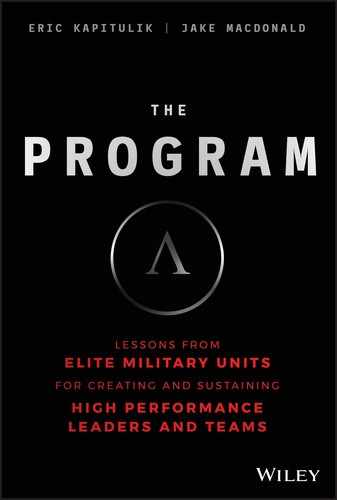74
Tell Your Teammates What You Want Them to Do!
IN TIMES OF stress, it is incredibly challenging for us to process negative communication. During adverse situations, our brain is often unable to process all the sensory input it is receiving. This is called “auditory exclusion.” It often leads to poor or inconsistent hearing. In a military or athletic scenario, negative communication means we may say, “Don’t shoot,” “Don’t pass,” or “Don’t call time out.” In corporate environments, a pharmaceutical company may suffer an unsuccessful launch of a new drug and marketing and sales managers tell their subordinates everything they need to stop doing. If we are experiencing adversity and feeling the corresponding stress that it induces, we experience auditory exclusion. Our military or athletic teammates often only hear “Shoot,” “Pass,” or “Call time out.” Our corporate teammates are challenged to remember what exactly they are supposed to stop doing rather than what they must start. All teammates react exactly the opposite of what we wanted them to do. This is partly because we may not hear the “don’t” part of the command. It is also because in those stressful situations, there are certain words that we are unconsciously waiting for, because they will allow us to take action, which we all want to do. Most importantly, if we are asking our team to stop doing certain things, it means that they have already made a habit of doing those things. As discussed in earlier chapters, it is a challenge to change habits. Cluttering our communication with both what needs to stop and what needs to start makes changing those habits even more difficult. Never tell a Marine “Don’t Shoot” in the middle of a firefight—as soon as he hears a “shh” sound, he is pulling the trigger. “Hold your fire” is much more effective. Although we may need to stop doing some things to turn around the financial quarter our corporate team may be experiencing, as leaders we need to understand that telling our team what not to do is not helping them figure out what actions to take. Discuss what you need to stop doing, but spend the great majority of your time communicating what to do. It makes remembering it easier. Further, after departing your weekly, nonstressful meeting, one of your salespeople will find themselves in an important, stressful sales meeting. As leaders, are we certain that that salesperson will not confuse what they are supposed to say with what they are not supposed to say? Are we confident that our salesperson will not confuse what they are supposed to do with what they are not supposed to do? Positively communicating helps ensure better outcomes. Michigan men’s basketball faced North Carolina in the 1993 National Championship. Trailing 73–71, Chris Webber, the most famous figure of the vaunted Michigan Fab Five, pulled down a rebound and started down the court. With 20 seconds left, they had plenty of time to set up one last play to take the potential winning shot. The only problem was that they had no timeouts left and could not set up a final play. They would just have to figure one out. As Chris dribbled up the floor he hesitated with the ball and traveled. The referee trailing the play either did not see it or chose not to call it. The UNC bench exploded in outrage. Knowing that he had traveled and almost cost his team the game, we can only imagine the stress this heaped on Chris’s shoulders, stress already magnified by the screaming fans, the bright lights, and the ticking clock. As he dribbled by the Michigan bench, the UNC defenders trapped him and pressed him into the corner. In deep trouble, Chris brought his hands together and called a timeout. The problem was that Michigan didn’t have any timeouts left. This resulted in a technical foul, which gave UNC two free throws and the ball. This effectively ended the Fab Five’s championship hopes. Chris Webber has never spoken publicly about the play. However, sources on the scene have confirmed multiple people screaming, “Don’t call timeout! Don’t call timeout.” Outside of combat, we can’t imagine a much more stressful environment than being down by two points in a National Championship basketball game with only a few seconds left on the clock. There could have been countless reasons why Chris Webber called a timeout in that situation. Ensuring the use of positive communication (i.e., “Throw it off his leg!”) or some other command telling Chris what to do, instead of what not to do, would have guaranteed that auditory exclusion was not among them. If necessary, discuss what needs to change, but always communicate to your teammates what you want them to do. Regardless of the battlefield, positively communicate.
